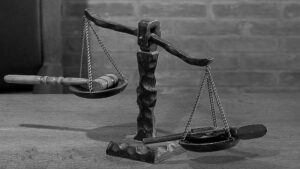Table of Contents
INTRODUCTION
In every profession, there are certain professional ethics that need to be followed by every person who is into such a profession. But there is the fact that professional misconduct is a common aspect, not only in other professions but also in advocacy also. certain acts are done by persons which seem to be unfit for the profession as well as which are against certain ethics in this field.
Meaning of Misconduct
The term misconduct means the transgression of some. established and defined rule of action a forbidden act, unlawful behavior, improper and wrongful behavior.
Section 35 of the act also says that advocates may be punished for professional. misconduct or other misconduct although the term misconduct and professional misconduct are not defined in section 35 or any other provision of the advocate act 1961.
The expression professional or other misconduct is mentioned in section 10 of the bar council act 1926 by using those words it was made clear that authority. might take action. in all cases of misconduct whether in a professional or another capacity.

Advocates Act
Section 35 of the Advocates Act, which is as follows, addresses professional misconduct by Indian attorneys and advocates:
If a person is found guilty of professional misconduct, the case will be referred to a disciplinary committee, a hearing date will be set, and the Advocate and the Advocate General of the State will be given a show-cause notice. After hearing from both parties, the State Bar Council’s disciplinary commission The disciplinary committee of the State Bar Council, after being heard of both the parties, may:
- Dismiss the complaint, or where the proceedings were initiated at the instance of the State Bar Council, directs that proceedings be filed;
- Reprimand the advocate;
- Suspend the advocate from practice for such a period as it deems fit;
- Remove the name of an advocate from the state roll of advocates
There are multiple kinds of misconduct, thus this expression must be considered broadly to extend the meaning under natural law. It is not justified to limit their natural meaning. The Bar Council of India has the authority to establish guidelines and standards for professional misconduct under Section 49 of the Advocate Act. According to the Act, it is against the advocate’s code of ethics for anybody to make advertisements or solicitations. Additionally, he is not permitted to use the name or service for unlawful purposes, demand payment for training, or place advertisements in publications, personal communications, or interviews.
Misconduct is broad enough to cover both misfeasance and malfeasance, and it applies to professionals. It also covers unprofessional acts, even if they are not always wrong. Any behavior that has the potential to reflect poorly on the legal profession or damage the positive perception that the public should have of it constitutes professional misconduct.
The Supreme Court ruled in State of Punjab v. Ram Singh that misconduct can include moral turpitude, must be improper or wrong behavior, unlawful behavior, wilful behavior, a forbidden act, a violation of an established and clear rule of action or code of conduct, but not just a mistake of judgment, carelessness, or negligence in the performance of duty.
Contempt of court as professional misconduct
Contempt of court may be defined as an offense of being disobedient or disrespectful towards the court or its officers in the form of certain behavior that defies the authority, justice, and dignity of the court. In various cases involving contempt of court, the court held that if any advocate or legal practitioner is found guilty of the act of contempt of court, he/she may be imprisoned for six years and may be suspended from practicing as an advocate (In re Vinay Chandra Mishra)
Case laws
In Sambhu Ram Yadav v. Hanuman Das Khatry, the appellant filed a complaint with the Rajasthan Bar Council against an advocate alleging that while acting as counsel in the case, the advocate wrote a letter alleging that the judge in question accepts bribes and requested Rs. 10,000 to acquire the judge’s favour. The Disciplinary Committee declared the advocate to be completely unsuitable to be a lawyer after finding the advocate guilty of “misconduct” The Rajasthan Bar Council’s conclusion that the legal profession is not a trade or business was upheld by the Supreme Court.
Members of the profession have a special responsibility to uphold the to ensure that justice is carried out legally, it is important to maintain the integrity of the profession and to deter corruption. The advocate’s actions were extremely improper because they not only interfered with the administration of justice but also damaged the profession’s standing in the eyes of the general public.
Professional ethics of an advocate
Professional ethics includes a moral code that governs how those working in the legal field and in the practice of law should behave. The court and the administration of justice are the two entities to which every member of the legal profession owes a supreme responsibility. In situations where there may be a conflict of duties, this duty takes precedence over all others
The set of guidelines that govern their professional behavior consequently results from the obligations they have to the court, their client, their adversaries, and other advocates. Chapter II, Part VI of the Bar Council of India Rules contains regulations on the professional standards that an advocate must uphold. In accordance with section 49(1)(c) of the Advocates Act of 1961, these Rules have been established
Advocate’s duties towards his client
- Bound to accept briefs.
- Not withdraw from service.
- Not appear in matters in which he is a witness.
- Full and frank disclosure to the client.
- Uphold the interest of the client.
- Not suppress any material of evidence.
- Not disclose any information about his client and himself.
- Not receive any interest in the actionable claims.
- Not charge depending on the success of matters.
- Keep proper accounts etc.
